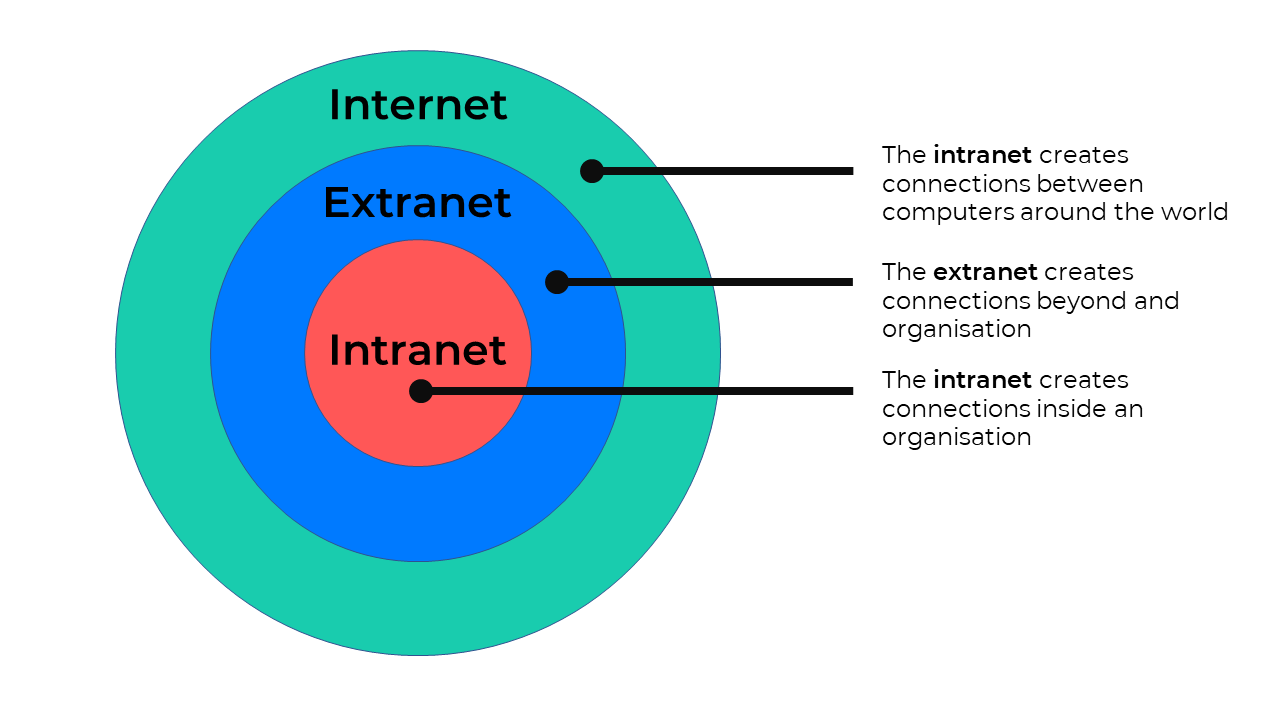Just what is the difference between the internet and an intranet? Do these two types of networks perform the same functions, or are they completely different entities? Both are certainly an integral part of most organisations across the globe. But how are they utilised within the business environment?
In this blog, we take a closer look at the intranet vs internet question. What are the key differences, and how can you decide which is best suited for your organisation’s needs? With an improved understanding of the intranet and internet differences, you’ll be better positioned to select the right tool to improve your communications company-wide.
Intranet vs Internet Definition
What is the difference between internet and intranet? We need to start by exploring the definition of the two networks. What is an intranet? And how does it intrinsically differ from the official definition of the internet?
Internet definition:
The internet is a worldwide system of computer networks. It connects computers all across the globe, allowing the access and exchange of information, and enabling an array of services for both business and personal use. Today, the internet is a public, autonomous facility accessed and used by hundreds of millions of people across the world.
Intranet definition:
Essentially, the intranet is a closed system of communication. It is a secure and private communication network within a company, a restricted version of the internet that doesn’t allow access to anyone outside its network. The core element of an intranet is the high privacy levels of the network and the fact that only internal access is granted.
Internet vs intranet:
The main difference is that the internet is a public network while an intranet is a closed network. In a nutshell, the internet is for all; an intranet is for a select group.
And what about extranets?
The question of ‘what is intranet and extranet’ may also arise. An extranet is a subsection of an organisation’s intranet. Like the intranet, it is a controlled private network. However, an intranet exclusively limits access to its workforce, while an extranet can also be accessed by authorised third parties, such as partners, clients and vendors.
It’s all in the prefix:
An easy way to remember the difference between the three types of network is to examine the meaning of the prefix:
- “inter” means “between”
- “intra” means “inside”
- “extra” means “outside”

Intranet vs Internet: Five Differences
#1 Connection
As discussed above, the core difference between intranet and internet is one of connection. While the internet creates a connection between computers worldwide, an intranet forms a connection between employees within an organisation. And an extranet creates a private connection between an organisation and its vendors or customers.
Why choose an intranet?
When it comes to internal communication, the closed connection delivered by an employee intranet will provide the best engagement results. With so much information readily available on the web, your job is to ensure employees can recognise official company content. A dedicated company channel, ideally displaying strong company branding, will deliver a platform that employees can trust.
#2 Security
Because the internet can be publicly accessed, it is entirely dependent on the user to secure their network connection. However, an intranet is not publicly accessible and is enforced by a robust firewall to prevent unauthorised access outside the company structure. An extranet is a hybrid of these models, offering restricted outside access and is protected by firewalls that separate the extranet from the intranet.
Why choose an intranet?
Current internal communication platforms offer robust security measures against external threats. The latest employee apps are often well covered with firewalls and virus protection, ensuring your company information is completely secure against hackers. New developments in intranet mobile apps deliver this high level of protection across personal devices as well. This means that your employee intranet can be accessed via smartphone and tablets, with the same level of security as an office PC.
#3 Regulation
Who’s in charge of the internet? The answer is no one. The internet is an unregulated network that has no overall management. In contrast, a company intranet is carefully and tightly regulated by policies guiding that single organisation. It can be cautiously policed and monitored to ensure all activity conforms to guidelines. An extranet is also regulated, but by multiple organisations, thus reducing the overall control.
Why choose an intranet?
Not only can you carefully monitor your company messages and information via an intranet, but you can also monitor the feedback that is received, and act upon it. While social media on the internet can be a free-for-all, this isn’t the case on an intranet portal. By providing two-way channels with monitored feedback platforms, you will know what your employees are thinking without losing overall control.
#4 Users
The most crucial difference when considering intranet or internet is the user base. The internet is accessible to anyone. On the other hand, your company intranet is only accessible to the employees in your organisation. And an extranet extends that level of accessibility to employees of all connected organisations in the extranet. This will have a critical impact on the information you can share and disseminate via each network.
Why choose an intranet?
If you’re looking to improve employee engagement, you need to ensure you’re sending out personalised messaging. Only an intranet can address your employees on a genuinely personal level. Your intranet software should deliver a dynamic blend of channels that are designed to engage and connect. An intranet app can help you keep communications relevant and personalised, by filtering content and relying on the inherently secure nature of the platform.
#5 Purpose
When you’re asking what is the difference between internet and intranet, the question of purpose becomes highly relevant. The internet lacks an overall purpose. As anyone can create content or share information, there are no specific goals to be achieved. Conversely, intranet design is built on the need to solve a particular set of issues such as knowledge sharing, data storage, and internal communication. An extranet has the more general purpose of improving collaboration between a company and its third parties.
Why choose an intranet?
How to create an intranet that really serves its purpose? It all starts with the intranet home page, which can be kept unfailing relevant and up-to-date, tailored to every employee to ensure that personal touch. Unlike the internet, you have complete control of your overarching intranet strategy. And with modern intranet apps offering built-in monitoring tools, you can keep a close eye on the impact of your communications.
Intranet vs Internet: In Conclusion
What is different between internet and intranet capabilities? These five critical areas highlight the significant differences between the two networks. As a public network, the internet offers limited options for successful internal communications within an organisation. Conversely, an intranet that has been designed and created to service your employees’ needs will immediately provide the solutions you are looking for.
The modern employee intranet is a highly effective network, offering personalised content, feedback opportunities and the ability to carefully monitor every step taken.







.jpg)
.jpg)